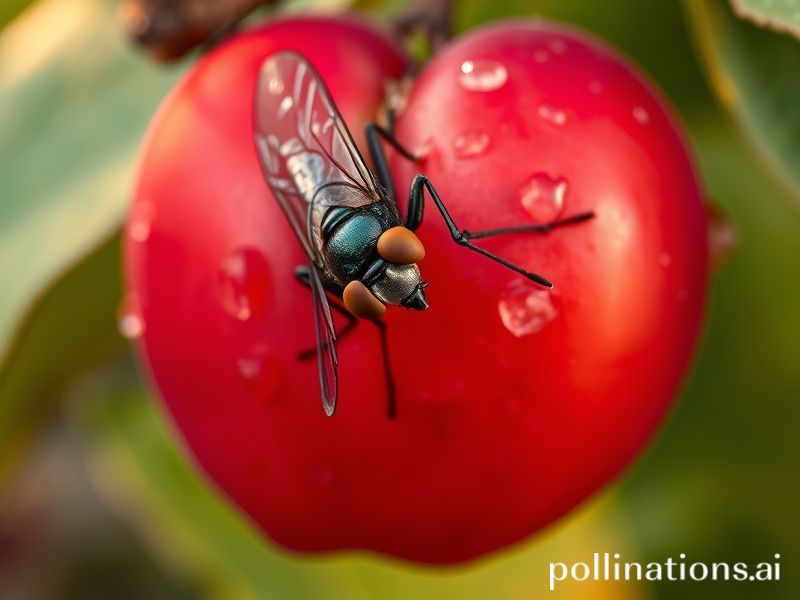Global Swat Team: How Fruit Flies Became the World’s Smallest—and Smuggest—Borderless Diplomats
The UN Security Council has debated nuclear proliferation, genocide, and who forgot to mute their microphone during closed sessions, but it has yet to confront the true axis of evil: Drosophila melanogaster, better known as the common fruit fly. From the fermented-mango stalls of Bangkok to the overpriced organic basil at a Brooklyn farmers’ market, this airborne speck of chaos has achieved what most multinational trade pacts only promise: frictionless border crossings. While we humans queue for e-gates, biometric scans, and the privilege of explaining our shampoo to a man in latex gloves, the fruit fly simply wafts past, passport-free and utterly unimpressed by our sovereignty.
Consider the geopolitical implications. Australia, a continent that treats incoming produce with the suspicion usually reserved for North Korean press releases, has spent millions erecting an “fruit fly exclusion zone.” The flies responded with a yawn and a breeding spree in Queensland’s mango belt, demonstrating the same respect for red tape that billionaires show for tax codes. Meanwhile, the Mediterranean’s citrus cartels wage quiet thermonuclear war—sterile male releases, pheromone confusion, drone surveillance—only to discover that evolution moves faster than EU subsidy paperwork. If Clausewitz were alive, he’d revise his maxim: war is merely the continuation of picnic policy by other means.
Zoom out and the picture darkens. Climate change has gifted the flies with newly tropical real estate: Swedish berry farms, Canadian vineyards, the once-frigid reaches of Patagonia. Where humans see catastrophic habitat loss, fruit flies see gentrification. Their larvae are the ultimate Airbnb squatters, turning plums into pulp condos faster than you can say “carbon footprint.” The World Bank frets over food security; the flies just secure the food first and let us foot the bill. In a cruel twist of fate, the same global shipping lanes that carry humanitarian grain also ferry eggs the size of dust motes—tiny Trojan horses with an insatiable appetite for Chardonnay.
Yet we persist in underestimating our adversary. Silicon Valley promises smart traps, AI-powered cameras, and blockchain traceability, as if the problem were simply a lack of venture capital. Meanwhile, rural Kenya strings up plastic bottles baited with banana mush—a solution costing roughly one-hundred-thousandth of a Series A round—and achieves comparable results. The flies, unbothered by either algorithm or austerity, continue their multi-generational orgy, completing the journey from egg to grandparent in under ten days. It’s the sort of reproductive efficiency that would make the Catholic Church weep into its census spreadsheets.
The human response reveals our tragicomic hubris. French vintners, those secular priests of terroir, have taken to playing loud techno in cellars, convinced bass drops will disorient the invaders. Japanese peach growers drape entire orchards in mesh kimonos that cost more per hectare than a downtown Tokyo parking spot. And in a twist that would delight Kafka, American supermarkets now sell “fruit fly carnivorous plants” wrapped in single-use plastic—solving one ecological disaster by gift-wrapping another. The flies, naturally, treat the Venus flytraps as garnish on their compost buffet.
What, then, is the broader significance of this six-legged plague? Simply put: the fruit fly is the unpaid auditor of globalization. It exposes our supply chains as porous fairy tales, our biosecurity as performative theater, our climate policies as half-rotten promises. Every time we swat, spray, or curse the air, we’re really swatting at the mirror. We built a world optimized for rapid transit of perishables and are shocked when something smaller than a breadcrumb hitches a ride.
So the next time you find a cloud of Drosophila holding court above your overpriced kiwi, pause before unleashing chemical warfare. Raise a glass—preferably covered—to our most honest diplomat: the insect that treats every customs declaration like the paper it is. In the end, the flies aren’t invading; they’re just collecting the visa stamps we inadvertently issued. And they never overstay their welcome because, frankly, they were never invited in the first place.







